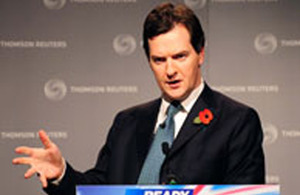British welcome of Asian business will hasten global economic recovery
As the Asian Financial Forum begins, Chancellor of the Exchequer sets out progress on RMB work and vision for UK-Asia trade and investment.

The Chancellor of the Exchequer, Rt Hon George Osborne MP
This year’s Asian Financial Forum will, I’m sure, continue to be a source of new ideas and inspiration. Twelve months ago, I addressed the forum with a simple message: that Britain is the natural home of Asian investment in the West. I said that the remarkable pace of growth in Asia was a huge opportunity for British businesses, if we could get out there and seize them. One year on, we are doing just that.
We’re moving away from an economy built on debt, to a balanced economy where we save, invest and export - and a strong relationship with Asia is a central part of that. Despite the tough economic conditions, British businesses are taking advantage of the opportunities Asia presents. Britain’s exports to China have grown by 42 per cent since the current UK government came into office and by 7 per cent to Hong Kong over the same period.
But now is not the time to be complacent. The global economy faces major challenges this year. East and West need to work together if we are to build a sustainable economic recovery in our changing world. Let me set out three areas where Asia and Britain can work together.
First, London can play a vital role in building the global renminbi market in 2013, acting as the Western hub for renminbi business, complementing Hong Kong as a bridge to the West. The potential for this market is clear: 12 per cent of China’s global trade was settled in renminbi last year, up from just 2 per cent in 2008. As two of the world’s leading financial centres, Hong Kong and London are natural partners in this, with London adding new corporate users of renminbi, new investors and intermediaries, and an extended time zone to Hong Kong’s offer.
The London-Hong Kong International RMB Forum held in London last month demonstrated there is increasing interest in the global renminbi market. The key this year will be to translate this interest into increased economic activity.
That’s why I was pleased to see China Construction Bank’s renminbi bond issue in London in December - the first renminbi bond issued by a Chinese bank outside mainland China and Hong Kong. And the Bank of England said last month that, should it become appropriate to establish a swap line with the People’s Bank of China, it would have no hesitation in doing so in the future.
Second, we should cement Britain’s position this year as a home of Asian investment, offering stable returns in an open and well-regulated economy. Last year, China became one of the leading investors into the UK, ranking alongside the US, Canada and India. This included £250 million (HK$3.1 billion) of investment from China Investment Corporation in London’s water network, and nearly £500 million of investment in Heathrow Airport Holdings in October - two examples of just how open Britain is to Asian investment. I want to build on that progress, which is why we are beefing up British chambers of commerce overseas.
Third, Britain and Asia should work together to defeat the forces of protectionism. Our economies all have a huge interest in promoting free trade. Within the European Union, Britain is the leading advocate for more progress. We should celebrate the EU-South Korea free-trade deal concluded last year. Now let us press on with the negotiations for an EU-Japan free-trade agreement and an EU-Singapore deal.
There is a lot more to do. By working together, the East and West can build a more balanced and sustainable global economy, bringing greater prosperity to all our citizens. As some of the world’s most open economies, let us show how it can be done.
(This article originally appeared in South China Morning Post on 14 January 2013.)